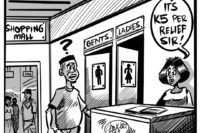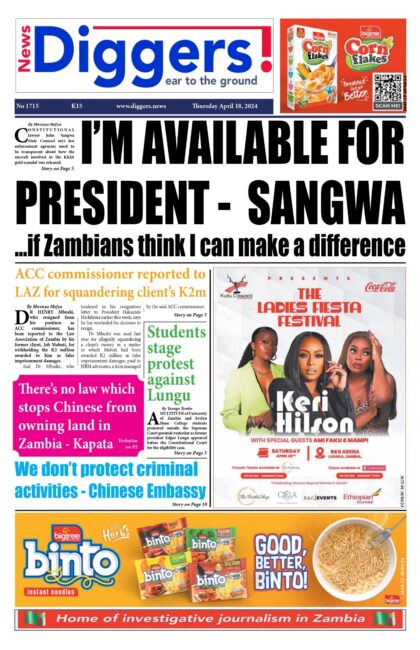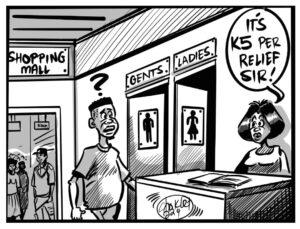Finance Minister Dr Bwalya Ng’andu has estimated that Zambia’s budgeted revenue will fall short of target by at least K14.8 billion, which is 19.7 per cent of the approved 2020 budget.
And Ng’andu says Zambia’s economy has been revised downwards and projected to grow at -2.6 per cent on account of the COVID-19 impact.
The Minister has also revealed that higher learning institutions, such as UNZA and the Copperbelt University (CBU) will continue to experience a delay in receiving their grants due to the extremely stressed fiscal space.
Meanwhile, Dr Ng’andu says the country has so far failed to secure external emergency funding towards the COVID-19 outbreak, as the country has not qualified to receive resources from multilateral institutions.
Speaking at a media briefing in Lusaka, Monday, Dr Ng’andu, claimed the IMF projection, announced that Zambia’s economy was revised downwards and was now projected to grow at -2.6 per cent from the earlier 3.6 per cent.
“In the case of Zambia, the IMF projects that the economy will grow by a negative 2.6 per cent in 2020 from the earlier projection of 3.6 per cent. The economic adjustments due to COVID-19 will result in a severe drop in revenue. It is estimated that the budgeted revenue will fall short of target by at least K14.8 billion or 19.7 per cent of the approved 2020 budget. The reduction by tax type, however, will be determined as more information unfolds,” Dr Ng’andu said at the Mulungushi International Conference Centre.
But data availed by the IMF reveals that Zambia’s real Gross Domestic Product (GDP) for this year is actually forecast to fall even further to -3.5 per cent on the back of the COVID-19 pandemic.
Other sub-Saharan African countries’ economies were equally revised downwards into negative growth, such as Cameroon at -1.2 per cent and the Democratic Republic of Congo (DRC) at -2.2 per cent.
However, other countries in the region, such as Tanzania and Kenya, despite being engulfed by the disease, are forecast to post positive growth of around two and one per cent, respectively, this year.
And he warned that UNZA and the CBU would continue experiencing delays in receiving their grants due to Zambia’s extremely stressed fiscal space.
He was responding to a question raised by Russian-trained economist Dr Lubinda Haabazoka, the Economics Association of Zambia (EAZ) president, a renowned UNZA lecturer, who wanted to know when government was going to finally pay grants to universities.
“…Then, this one is coming from the Copperbelt University (CBU), when are you going to give grants to universities? Because, when you look, for example, Mopani (Copper Mines Plc), says they are winding up. The second major contributor of liquidity in Kitwe, for example, is the CBU! But salaries are not paid regularly, including even at the University of Zambia. Now, if we paid salaries in those institutions, those people pay their tenants, the tenants buy food, we are going to enhance liquidity, I think that is one way of helping maintaining liquidity in the economy,” Dr Haabazoka asked.
“You (Dr Haabazoka) were concerned about our delays in paying salaries to the universities, both the University of Zambia and Copperbelt University. I do realize that you will appreciate that we have had some challenges of meeting resources from time to time, but we try to remain as current as we can. In fact, the grants to CBU and UNZA were paid or funded last week. So, for now, I think the problem is gone. But what this speaks to, when you see delays, is the challenges of liquidity that we tend to have. I did indicate in this presentation that my revenue base is shrinking so we will have slight challenges in meeting some these payments when they are due,” he replied.
Meanwhile, Dr Ng’andu said that Zambia had so far failed to secure external emergency funding towards the COVID-19 outbreak, as the country did not qualify to receive resources from multilateral institutions.
Last month, Dr Ng’andu said that government had commenced applications to multilateral partner organizations for COVID-19 support, which included the International Monetary Fund (IMF) and World Bank who have a combined total of US $64 billion to aid IDA countries.
But he told journalists at that Zambia was still awaiting receipt of funds to help government tackle the virus, mainly because the country’s per capita income did not meet the threshold required to access the external support under the Fund’s Catastrophic Containment and Relief Facility (CCRT).
“A number of multilateral institutions have announced various windows under which they will give emergency support facilities to mitigate the impact of Covid-19. The IMF which has four different windows has already disbursed support to 25 countries under the Catastrophic Containment and Relief Facility (CCRT). The eligibility criteria requires that a country’s per capita income be below the International Development Association’s operational cut off, which is currently at US $1,175. Zambia, being a middle income country and with a per capita of US $1,539, does not qualify for support under the Catastrophic Containment and Relief Trust. However, we are engaging the IMF with the view to benefit from other appropriate facilities to which Zambia qualifies,” Dr Ng’andu said.
He added that talks with other lenders to access external assistance remained in progress.
“Zambia has applied to the World Bank, the African Development Bank and Afreximbank to be considered for support under their various COVID-19 Emergency Funds. Bilateral discussions have also commenced with a number of G-20 countries on the postponement or rescheduling of debt service payments over a period to be agreed. Engagement with the bilateral partners centre around the possibility of them meeting the financing gap arising from the adverse effects of COVID-19 on the fiscus. I will provide an update as and when we reach agreements,” he added.
On progress made for Zambia to get on a IMF-backed economic bailout programme for balance of payments support, Dr Ng’andu said that talks with the Fund were ongoing.
“With respect to an economic programme, Zambia has just completed a two-week virtual mission with the IMF at which an assessment of the macroeconomic and fiscal situation was undertaken. This follows Zambia’s request for an economic programme with the IMF which was made at the end of 2019. On the basis of the Mission’s outcome, Zambia will now discuss with the fund on an appropriate macroeconomic framework that may lead to a programme,” he said.
He also projected that mining tax revenues will drop this year, as mining companies battle the effects of reduced copper prices on the international market, coupled with the COVID-19 pandemic.
“Projections suggest that the reduction in the price of copper on the London Metal Exchange (LME) will continue until June resulting in a drop in mineral royalty and income tax payments from mining companies. Pay as You Earn (PAYE) from the mining sector is also expected to fall as some contractors may lose their contracts going forward. The scaling down of mining sector activities will lead to reduced engagement of foreign providers of management services, hence affecting Withholding tax receipts on management fees and consultancy,” he said.
“The scaling down of economic activity is expected to cut across all sectors including manufacturing, transport, power generation and transmission, wholesale and retail trade, tourism and the hospitality industry in general. This will basically translate into a reduction in all tax and non-tax revenues among them PAYE, VAT, customs duty, excise duty, fuel levy, export duty, road user charges, fees and fines.”
He, however, added that government had decided to waive tax penalties and interest on outstanding tax liabilities resulting from the impact of COVID-19 to help cushion local businesses.
“To assist companies and businesses manage their cash flows during this period when they are faced with reduced revenues, government has decided to waive tax penalties and interest on outstanding tax liabilities resulting from the impact of COVID-19. The Zambia Revenue Authority will soon issue guidelines on the criteria on who qualifies, the period of relief and other related modalities,” he announced.
He further urged lending institutions in the country to consider halting loan repayments during the Coronavirus pandemic in a bid to help cushion businesses that were struggling from the devastating economic impact brought about by the disease.
“Many businesses will fail to make their payments as and when they fall due not because they do not want to, but because they cannot. To avert unnecessary business failures, foreclosures, liquidations and receivership, I would like to urge all lending institutions to exercise forbearance and where appropriate to consider giving moratorium on loan repayments for a prescribed period of time, capitalise interest repayments or even extend the period loan repayments periods,” urged Dr Ng’andu.
The economic adjustments due to COVID-19 will result in a severe drop in revenue.
It is estimated that this year’s budgeted revenue will fall short of target by at least K14.8 billion or 19.7 per cent of the approved 2020 budget, according to Ministry of Finance data.












